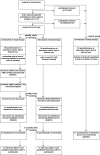Knowledge translation on dementia: a cluster randomized trial to compare a blended learning approach with a "classical" advanced training in GP quality circles
- PMID: 17587452
- PMCID: PMC1931439
- DOI: 10.1186/1472-6963-7-92
Knowledge translation on dementia: a cluster randomized trial to compare a blended learning approach with a "classical" advanced training in GP quality circles
Abstract
Background: Thus far important findings regarding the dementia syndrome have been implemented into patients' medical care only inadequately. A professional training accounting for both, general practitioners' (GP) needs and learning preferences as well as care-relevant aspects could be a major step towards improving medical care. In the WIDA-study, entitled "Knowledge translation on dementia in general practice" two different training concepts are developed, implemented and evaluated. Both concepts are building on an evidence-based, GP-related dementia guideline and communicate the guideline's essential insights.
Methods/design: Both development and implementation emphasize a procedure that is well-accepted in practice and, thus, can achieve a high degree of external validity. This is particularly guaranteed through the preparation of training material and the fact that general practitioners' quality circles (QC) are addressed. The evaluation of the two training concepts is carried out by comparing two groups of GPs to which several quality circles have been randomly assigned. The primary outcome is the GPs' knowledge gain. Secondary outcomes are designed to indicate the training's potential effects on the GPs' practical actions. In the first training concept (study arm A) GPs participate in a structured case discussion prepared for by internet-based learning material ("blended-learning" approach). The second training concept (study arm B) relies on frontal medical training in the form of a slide presentation and follow-up discussion ("classical" approach).
Discussion: This paper presents the outline of a cluster-randomized trial which has been peer reviewed and support by a national funding organization--Federal Ministry of Education and Research (BMBF)--and is approved by an ethics commission. The data collection has started in August 2006 and the results will be published independently of the study's outcome.
Trial registration: Current Controlled Trials [ISRCTN36550981].
Figures
Similar articles
-
Factors affecting feasibility and acceptability of a practice-based educational intervention to support evidence-based prescribing: a qualitative study.Fam Pract. 2004 Dec;21(6):661-9. doi: 10.1093/fampra/cmh614. Epub 2004 Nov 4. Fam Pract. 2004. PMID: 15528289
-
What is the role of quality circles in strategies to optimise antibiotic prescribing? A pragmatic cluster-randomised controlled trial in primary care.Qual Saf Health Care. 2007 Jun;16(3):197-202. doi: 10.1136/qshc.2006.018663. Qual Saf Health Care. 2007. PMID: 17545346 Free PMC article. Clinical Trial.
-
[Implementation and evaluation of quality circles in general practice].Z Arztl Fortbild (Jena). 1995 Aug;89(4):402-5. Z Arztl Fortbild (Jena). 1995. PMID: 7571743 German.
-
Collaborative online learning: a new approach to distance CME.Acad Med. 2002 Sep;77(9):928-9. Acad Med. 2002. PMID: 12228097 Review.
-
How to plan, deliver and evaluate a training session.Aust Fam Physician. 2004 Jun;33(6):453-5. Aust Fam Physician. 2004. PMID: 15253610 Review.
Cited by
-
Using developmental research to design innovative knowledge translation technology for spinal cord injury in primary care: Actionable Nuggets™ on SkillScribe™.J Spinal Cord Med. 2014 Sep;37(5):582-8. doi: 10.1179/2045772314Y.0000000243. J Spinal Cord Med. 2014. PMID: 25229739 Free PMC article.
-
Teaching differential diagnosis in primary care using an inverted classroom approach: student satisfaction and gain in skills and knowledge.BMC Med Educ. 2015 Apr 1;15:63. doi: 10.1186/s12909-015-0346-x. BMC Med Educ. 2015. PMID: 25879809 Free PMC article.
-
[Development and implementation of the dementia guideline of the German Society of General Practice and Family Medicine].Med Klin (Munich). 2010 Jan;105(1):41-7. doi: 10.1007/s00063-010-1005-y. Med Klin (Munich). 2010. PMID: 20127438 German.
-
Assessing dementia in resource-poor regions.Curr Neurol Neurosci Rep. 2012 Oct;12(5):511-9. doi: 10.1007/s11910-012-0300-9. Curr Neurol Neurosci Rep. 2012. PMID: 22864986 Free PMC article. Review.
-
General Practitioners' preferences and use of educational media: a German perspective.BMC Health Serv Res. 2009 Feb 16;9:31. doi: 10.1186/1472-6963-9-31. BMC Health Serv Res. 2009. PMID: 19220905 Free PMC article. Clinical Trial.
References
-
- Seufert S, Mayr P. Fachlexikon e-le@rning. Vol. 1. Bonn , managerSeminare Verlags GmbH; 2002. p. 144.
-
- Hallauer JF, Kurz A. Weißbuch Demenz. Vol. 1. Stuttgart , Thieme Verlag; 2002. p. 137.
-
- Melchinger H, Machleidt W. Werden Demenzpatienten in Hausarztpraxen lege artis behandelt? Ergebnisse einer Interviewstudie. Zeitschrift für Allgemeinmedizin. 2005;81:191 –1196. doi: 10.1055/s-2004-836269. - DOI
-
- Melchinger H, Machleidt W. Hausärztliche Versorgung von Demenzkranken. Analyse der Ist-Situation und Ansätze für Qualifizierungsmaßnahmen. Nervenheilkunde. 2005;24:493–498.
-
- Bundesministerium für Familie Senioren Frauen und Jugend Vierter Altenbericht zur Lage der älteren Generation in der Bundesrepublik Deutschland: Risiken, Lebensqualität und Versorgung Hochaltriger – unter besonderer Berücksichtigung demenzieller Erkrankungen. 2002.
Publication types
MeSH terms
Associated data
LinkOut - more resources
Full Text Sources
Medical


